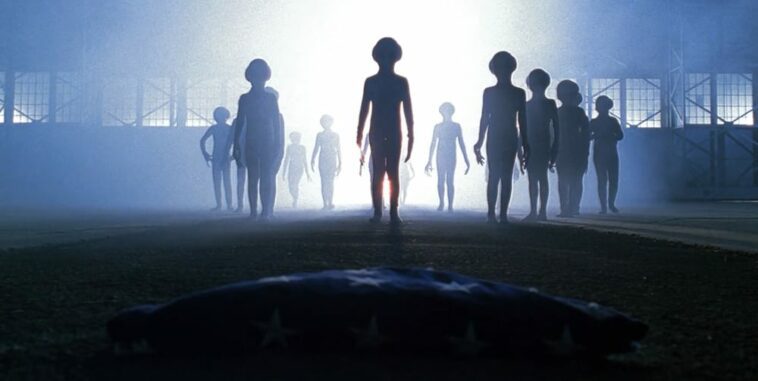A major motion picture was always going to be a tough act to follow, but Season 6 of The X-Files reminded audiences why the medium of television works so well. Every episode is a colourful pocket of drama and character—despite being dubbed, apparently derogatorily, ‘X-Files Lite’, it is a season that perhaps doesn’t get enough credit for what it is trying to do. The so-called ‘LA era’ gave the writers pause to reflect, and as a result, the season can be viewed as a continuous but multifaceted meta commentary on what the show used to be and what it had become.
Like any good season of television, the episodes are interconnected by themes and threads, despite the disjointedness of the monster-of-the-week structure. To pick an inane example of such a thread, the cold open of ‘The Beginning’ is like something out of a horror movie—and it set a precedent, because there seems to be more fake blood used in Season 6 than in any other season of the show.
It gets more interesting than that. Whatever happened between Chris Carter and David Duchovny around this time bled into the writing in comedic ways—since the move to LA was largely due to Duchovny’s insistence, it is endlessly funny that the second episode of the season is about a man whose head will literally explode if he doesn’t make it to California. The move from Vancouver to LA was a really big deal. The X-Files traded the claustrophobic fog of the Canadian forests for the eerie, vapid, desert suburbs that feature prominently in ‘The Beginning’ and ‘Arcadia’, capturing a quality of unreality in spaces where man forces himself onto nature. It is fitting then, that many of the episodes, particularly in the first half of the season, are obsessed with spatial barriers (the Bermuda triangle in ‘Triangle’, the ‘Dreamland’ anomaly, etc.). In ‘How the Ghosts Stole Christmas’, the blood disappears off of Mulder and Scully’s clothes the second they exit the house, thus ending the illusion; in light of the move to LA, it is appropriate that Mulder and Scully are investigating how movement through space can affect a person’s reality.
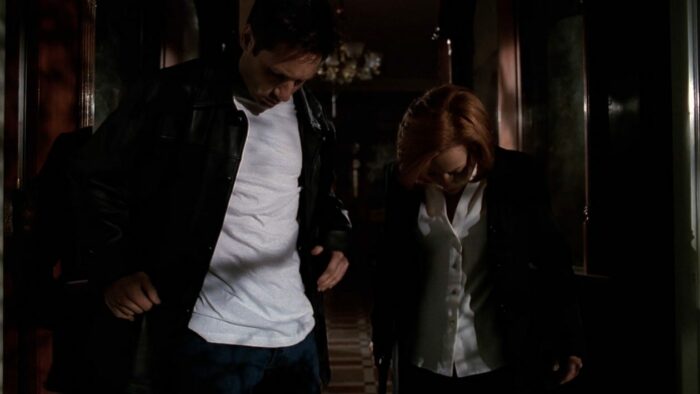
The mid-season two-parter, ‘Two Fathers’/’One Son’, upended the mythology as we had come to know it, and impressively manages to tie in events, objects, and character arcs from across all seasons. Thematically it focuses largely on legacy and inheritance. The X-Files mythology is fundamentally a generational story—the struggle that belonged to Bill Mulder and CSM is passed down to Fox and Jeffrey, will one day be passed to William. There is also something meta about the relationship between a father and his progeny—the show has internalised the external push and pull between Carter and his creation to become some kind of self-aware pretzel. The titles of these episodes are as intriguing as a little on the nose, because we could assume that the two fathers are Bill Mulder and CSM (the one son being anyone from Jeffrey Spender to Alex Krycek) or that they are Carter and Spotnitz (literally the authorial fathers to these episodes) or even Carter and the fandom, meaning the show itself is the son.
To continue in this vein, there are several amusing meta-textual lines in the episodes, including: “I could never have scripted the events that led us to this,” which is very fitting given the rather chaotic approach to plotting. Words like “scripted”, partnered with the structural device of CSM’s expository narration, serve as Verfremdungseffekt (distancing effect)—in other words it says: ‘this is a story and all stories inevitably reach a conclusion’.
Rather than being a weakness, Mulder and Scully’s notable absence from most of this two-parter is actually a testament to the strength of the ensemble. Chris Carter is obsessed with duos and pairs—every character is a narrative foil for another. It gives the ensemble episodes real depth, because the show has spent seasons establishing these dichotomies and now all the characters are knotted together and pulling away from each other. It’s a test for them and for the narrative. Even the tiniest moments—such as when Krycek sees what has become of Marita—are bursting with significance.
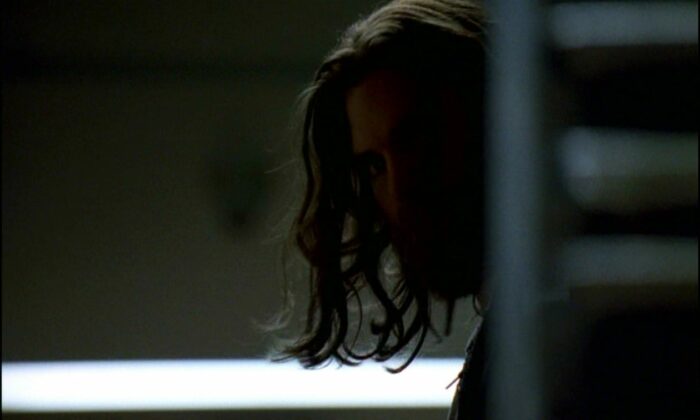
The more playful tone of Season 6 allows for some pleasing theatrical elements. For example, in ‘S.R. 819’, Krycek is brought back in disguise like a portent of death in a Renaissance play. The use of long takes in ‘Triangle’ was inspired by Hitchcock’s Rope, which itself is an adaptation of a play. In fact ‘Triangle’ employs a dramatic device familiar to fans of modern theatre—that of multi-roling. Gillian Anderson plays both Scully and an OSS agent; William B Davis is CSM and a Nazi Officer—the list goes on. This is again an example of the distancing effect. It serves to emphasise what any media usually tries to deny, that the characters are not ‘real’ people, but rather actors who are there to fulfill a role as required by the writers. In ‘Triangle’, characters are broken down to their bare essentials and become plot devices (such as Mitch Pileggi’s second character, the Nazi who was secretly on Mulder’s side all along). This is really how the whole series works (it’s obvious in characters like Krycek, who often shows up to move the plot along then disappears again), but our attention is never drawn to it quite so clearly. Moreover, the distancing effect is meant to make the audience a little uneasy, but it’s possible that ‘Triangle’ has inadvertently contributed to a sense of disillusionment that permeates Season 6.
The move to LA and the circumstances that prompted it were no secret, and this may have somewhat disillusioned the viewer. A TV show is a TV show and it will be subject to the desires of studios, creators, and actors, but people who are trying to get lost in the world of Mulder and Scully don’t necessarily want to be reminded of this. Sometimes it feels like the show is playing “a centre that cannot hold” (‘S.R. 819’). That is, the one between itself and the fandom (or even between different factions within the fandom). Is the only way to survive to not pick a side? The ‘Triangle’ kiss between Mulder and not-Scully is the perfect example of this because it sort of gives shippers what they want, but not to the point that it would upset any no-romos, because it can easily be disregarded.
In the early years Carter’s smartest moves had been to bring in new writers with little experience but lots to offer—the obvious example being Vince Gilligan. After ‘Soft Light’ landed him a seat at the table, his first script as a permanent writer was no less than ‘Pusher’. In contrast, Jeffrey Bell was new to The X-Files in Season 6, his writing contributions being ‘The Rain King’ and ‘Alpha’—two episodes that are not without their charms, but frequently rank right at the bottom of the pile. David Amann also joined the writing team with ‘Terms of Endearment’ and ‘Agua Mala’. Surely it is not a coincidence that the season’s weakest episodes were by the new writers—quite possibly there were simply no more Vince Gilligans in the world to be found. Much of the old crew was left behind in Canada, and the show was always going to be different as a result.
Season 6 has often been criticised for not being ‘X-files-y’ enough, which is why it is fitting that this season brought us ‘Arcadia’. This is fundamentally an episode about conformity. How dare the writer’s room not conform to the C C and Rs! Similarly, ‘Monday’ is an episode about breaking free from monotony, and didn’t everyone love ‘Monday’?
Two episodes that receive a lot of undue criticism are the ‘Dreamland’s. So Mulder dancing in front of the mirror was corny, but the overall concept is fascinating, and the dialogue is often very insightful. It often feels like a continuation of Season 4’s ‘Small Potatoes’, with all its questions about what it is that makes a person who they are, and how much of a person’s identity exists in their face. Though only briefly (because the audience sees Fletcher as Fletcher) we see Duchovny do what Anderson did in ‘Triangle’, and play a character who looks exactly like Mulder but isn’t really Mulder. Fletcher is neglectful and womanizing and selfish. He has no regard for human life. He’s all the worst parts of Mulder amplified, except that Fletcher is not the kind of person who would run into a collapsed building to rescue a stranger. These episodes reveal to the viewer how much they love (or don’t love) Mulder for who he is.
“If you don’t like the man you’ve become I don’t blame you one bit. But this flight from reality isn’t the answer. Accept who you are.” (‘Dreamland II’)
It is appropriate that in a season which challenges some of the fundamental features of the show, we are invited to question what it is that makes a character who they are.
“What is it to be a human, Fox? Is it to have the chemistry of a man? […] Of course not. To be a man is to have the heart of a man.” (‘The Unnatural’)
Episodes like ‘Monday’ and ‘S.R. 819’, which revisit the same series of shots over and over, are self-conscious and obsessive. The latter episode teases us with the reappearance of Krycek, as if it is testing us to see how long it takes for us to realise that it’s him. The use of flashbacks in this episode speaks to the idea of changing the past, or at least changing the way we (literally) see it. And perhaps it is a nod to the fandom—the more obsessive side of the fandom at least, because we know exactly what it means to rewatch the same thing over and over and notice new things each time.
It’s notable that both Mulder and Scully become objects of obsession at different points in this season, each to dire consequences. The show has become hyper-aware of the impact it has on audiences, and perhaps no impact has been greater than the MSR phenomenon. The role of the ever-unpopular Diana Fowley is to force Mulder and Scully to confront how they feel about each other, and to force the viewer to confront how they feel about Mulder and Scully. There are several episodes that are clearly allegorical of Mulder and Scully’s relationship (be that platonic or romantic)—‘The Rain King’, ‘Alpha’, ‘Milagro’—but few episodes that actually show their relationship in any real sense without descending into further commentary. There is a longing for a return to the good old days of ‘Detour’, which synthesises the realistic and endearing parts of their relationship with a fun and straight-forward X-file. Scully says in ‘The Rain King’: “the best relationships…are frequently the ones that are rooted in friendship”. Long-suffering MSR shippers would immediately know exactly what this means, but perhaps for a new viewer who saw Fight the Future and just started the show at Season 6, it might not be so clear. There’s not an awful lot of Mulder and Scully’s friendship to be found—a lot of the time, the writers are either struggling to push their relationship into romance, or making meta self-reflective points about how co-dependent they are. This is all fascinating to watch, but ironically lacks some heart. The best effort Season 6 makes is the nonfat tofutti rice dreamsicle scene in ‘The Unnatural’.
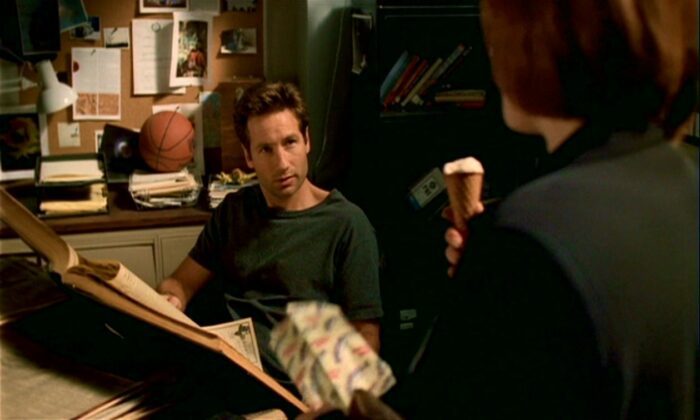
When does a piece of art become too self-referential? Does the omniscient authorial hand ruin the simple enjoyment of a show? Cases like the random return of Arthur Dales in ‘Agua Mala’, or the achromatic gimmick in ‘Tithonus’ that is a little too similar to ‘Tooms’, can take a viewer out of an episode. In other cases it seems like the show is trying so hard to be proud of itself for how far it has come (rightfully so) that it becomes like a snake eating its own tail. For example, ‘How the Ghosts Stole Christmas’ is a fantastic episode, returning to a familiar tone of cynicism, specifically regarding Mulder’s personality, but it comes right off the back of the ‘Dreamland’s. In all three of these episodes a lot of time is given to reflecting on Mulder and Scully, their individual personalities, and their journey together. They seem to be stuck in a perpetual anagnorisis. Perhaps their self-realisations at the end of ‘How the Ghosts Stole Christmas’ would probably have been far more impactful if we hadn’t have just covered all of that in Fletcher-gate.
“I might just as easily not have a waterbed then I’d be on time for this meeting. You might just as easily have stayed in medicine and not gone into the FBI, and then we would never have met. Blah, blah, blah…” (‘Monday’)
Yes the ‘blah blah blah’ is very appropriate, because we have heard this before. Mulder is listing variables, the endless variables, that have made his and Scully’s lives what they are. This is not a bad way to look at the show. After all, where does the essence of the show lie? Firstly, if you’re a non-essentialist, this is a category error, but pause your metaphysical quibbles and consider these contenders: is it Mulder and Scully? Chris Carter? Vancouver? The cast and crew? In the making of a TV show there are lots of variables, and you can catch these variables at a critical intersection and we call this intersection ‘art’. But the moment for this passes quickly and can never be recreated.
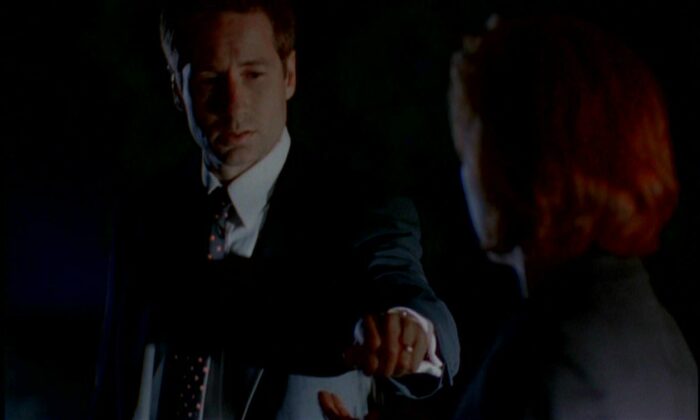
Season 6 lives in the shadow of the Vancouver era—it is in the Canadian forests that many consider the ‘essence’ of the show to lie. The child really is father to the man, but there is a flaw when the show tries too much to be like its old self. ‘Agua Mala’ couldn’t choose between horror and comedy—it tries to be ‘Lite’ and Vancouver-esque at the same time, and doesn’t satisfy either; on the other hand, ‘Arcadia’ attempts a similar thing but is much more successful. Why? Because ‘Arcadia’ fully leans into the California-cation of the show—the setting is deliberately bright and sunny and provides comedic opportunities whilst also being essential to the horror.
“How can you have too much life?” (‘Tithonus’)
‘Tithonus’ is an episode that tries to teach us that things are special because they end. Sure, we can mourn the Vancouver era, but it can’t be denied that Season 6 is a fantastic season. The high concept experimental Vince Gilligan-y style is very enjoyable. Fans surely appreciate episodes like ‘Tithonus’ that make them stop and think and ask questions about the show that they love. But back-to-back-to-back self-reflective episodes can begin to feel both overstuffed and hollow—luckily, The X-Files never stops being its playful self, and there’s nothing wrong with being meta if there are flying cows involved.

